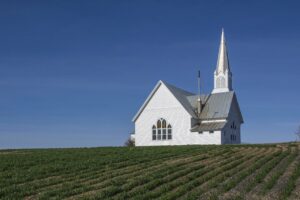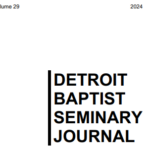Religious Liberty: “We Give Thanks for the Freedom We Have to Worship Publicly”
You’ve probably heard someone pray at church (and likely have prayed yourself) something like the title of this post: “We give thanks for the freedom we have to worship publicly.” This prayer is set in contrast to the experience of many Christians in different times and places where they had to hide their gatherings from hostile governments. That freedom we give thanks for is part of religious liberty.
Religious liberty does not only include the ability to gather for church in public and without government interference, but it also addresses questions as to whether or not a Christian school can fire someone for practicing witchcraft, whether or not a Christian florist has to make arrangements for a gay wedding, whether or not a doctor can refuse to perform an abortion, etc.
Just in the last couple of days, I saw three different news stories related to questions of religious liberty: concerns over whether the state of Minnesota will undermine religious liberty by forbidding churches from firing someone who identifies as gay or transgender; the Biden administration touting a move they claim improves religious freedom by no longer requiring “beneficiaries [of government-funded social services] to participate in any religious activity in order to receive help”; and the ruling of a federal judge that the government cannot force Christian organizations to pay for transgender surgeries.
The issue of religious liberty is tied to the question of the relationship of church and state/government. In America, we might assume that religious liberty is a given, but in many ways, it was Baptists who championed this belief. Religious liberty, and the related belief that there should be no state-established religion, flow out of Baptist distinctives.
Dr. Andrew Walker will be presenting the Rice Lecture for DBTS on March 22. He has written extensively on religious liberty and church-state relations. In his book Liberty For All: Defending Everyone’s Religious Freedom in a Pluralistic Age, Dr. Walker shared how he came to appreciate the connection between religious liberty and Baptist ecclesiology:
“All of these questions about religion and society led to a flood of first-principle questions, among them the following:
- How does one understand what truth is?
- How does an individual come to grasp religious claims?
- What posture should the state take toward religion?
- How is one’s quest to understand truth related to their personhood?
- What is the relationship between moral obligation and religious foundation?
- What are one’s obligations to the state? To God?
- What are the jurisdictions and responsibilities of the state?
- What are the jurisdictions and responsibilities of the church?
- Who gets to decide who is right and wrong about such matters as religion and morality?
- What is the relationship between religious liberty and other liberties?
When I began to answer these questions, I was led to a distinctly Baptist ecclesiology. It was in the Baptist tradition, which had helped birth religious liberty in North America through the likes of Roger Wiliams and John Leland, that I saw the principles of religious liberty most fulsomely applied. How so? Because the questions above are best answered in light of key Baptist ecclesiastical distinctives that focus on the individual and the associations they form in life” (p. 230).
In his introduction to another book he helped edit, Baptist Political Theology, Dr. Walker highlights the value of the Baptist perspective on religious liberty in protecting true Christianity:
“Most Christian traditions in the modern era support basic civil and political rights and find biblical support for them in the idea that all humans bear God’s image and have coequal moral worth. But Baptists add our distinctive doctrine of religious freedom and disestablishment, an additional bulwark against authoritarianism and a cornerstone of free government. This is an especially needful truth to revive today. We live amidst an upsurge in nationalist sentiment and rising authoritarian powers, which bring twin dangers to the right relationship of church and state. On the one hand, nationalism has historically almost always come tinged with religious rhetoric, religious symbolism, and even religious demagoguery. Statesmen know the power of religion, and if they can tap into that power and redirect it to themselves, they will. On the other hand, in reaction, nationalists’ opponents often blame religious institutions and religious leaders, equate religion with the political agenda they oppose, and seek to shrink, ban, or silence religion in the public square. That means religion is in danger of hijacking by one side and proscription on the other; of being used and manipulated; and of being ignored, sidelined, and neglected. In this context the Baptist political witness is crucial. More than another other Christian tradition, we can insist on the importance of disestablishment and warn of the dangers of being co-opted by those in power—at the same time and with the same framework that we insist on the vital necessity of religious freedom and a robust and vocal Christian presence in the public square.” 11-12
Religious liberty is something Christians, and especially Baptists, should value and work to maintain. We hope you will join us on March 22 to go more in-depth on this important topic.



